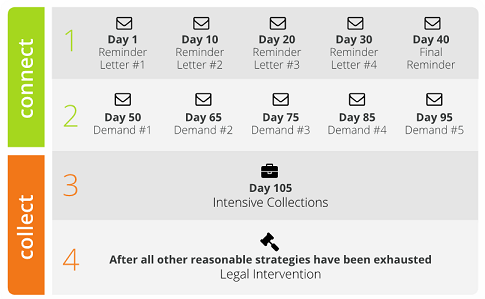For over a two decades, Collect911 has been the trusted partner for thousands of businesses, government institutions, colleges, hospitals, and dental and medical practitioners. Fully licensed in California and all 50 states—including Puerto Rico—we have the capability to pursue collections nationwide, even if your debtor has moved out of state.
We offer dedicated teams specializing in both B2B (Commercial Debt) and B2C (Consumer Debt) recovery, ensuring that your specific needs are met with expertise and precision.
What Sets Us Apart from Other Collection Agencies:
-
Customer-Centric Approach: We make the process incredibly easy by adapting to your needs—not the other way around.
-
Flexible Service Options: Choose between our low-cost Flat-Fee Connect Service—where accounts never expire and debtors pay you directly—or the traditional Contingency Service.
-
Exceptional Reputation Management: We understand the importance of your business reputation. Collect911 boasts one of the highest Google Ratings among collection agencies, with over 2,000 reviews averaging 4.8 out of 5 stars—and impressively, 90% of these reviews are from individuals we’ve collected from.
-
No Hidden Fees or Commitments: Enjoy our services without any minimum balance requirements, minimum number of accounts, setup fees, or binding contracts. Our customer agreement is open-ended and non-committal.
-
Complimentary Credit Bureau Reporting: Benefit from free credit bureau reporting, enhancing the effectiveness of our collection efforts.
-
High Recovery Rates with Full Compliance: We achieve excellent recovery rates while strictly adhering to FDCPA, HIPAA, TCPA, and GLBA regulations.
-
Personalized Support: Beyond our central customer service team, you’ll have a dedicated Sales Representative assigned to you for direct, personalized assistance.
-
State-of-the-Art Security: We take your security seriously. All accounts are managed through our secure online client portal with two-factor authentication enabled, ensuring your data is protected at all times.
Our Services:
We offer a range of fixed fee and contingency agency services.

Contact us for a free consultation:
| Tell us a little bit about you |
| |
California Collection Laws:
Here’s an overview of some of the most important debt collection laws in California:
-
The Rosenthal Fair Debt Collection Practices Act (RFDCPA):
- This California-specific law is an extension of the federal Fair Debt Collection Practices Act (FDCPA). It regulates the behavior and practices of debt collectors in the state.
- The RFDCPA broadens the definition of “debt collector” to include creditors collecting on their own debts and attorneys who collect debts on a regular basis.
- Prohibitions under this act include: using obscene or abusive language, making false threats of violence or legal action, disclosing the debtor’s debt to third parties without permission, and calling at unusual or inconvenient times.
-
California Civil Code Section 1788-1788.33:
- This section outlines specific protections for California consumers against abusive debt collection practices. These regulations serve as the backbone of the RFDCPA.
- It mandates that debt collectors provide specific notifications to consumers and includes provisions against misrepresentation and unfair practices.
-
Time-Barred Debts:
- California has a statute of limitations on the time period during which a creditor or collector can sue to collect a debt. The exact length of time varies based on the type of debt. For instance:
- Oral contracts: 2 years
- Written contracts: 4 years
- Promissory notes: 4 years
- Open-ended accounts (e.g., credit cards): 4 years
- California has a statute of limitations on the time period during which a creditor or collector can sue to collect a debt. The exact length of time varies based on the type of debt. For instance:
-
Communications:
- Debt collectors are generally restricted from contacting consumers at their place of employment if they are informed (either orally or in writing) that the consumer is not allowed to receive such communications there.
- Collectors cannot contact consumers before 8 a.m. or after 9 p.m. local time, unless the consumer gives permission.
-
Debt Validation:
- Under California law, if a consumer disputes a debt in writing within 30 days of the first contact from the collector, the collector must cease collection efforts until they provide verification of the debt.
-
Wage Garnishment:
- California has specific laws that limit the amount of wages that can be garnished to repay a debt. The state provides greater protection than federal law, allowing only the lesser of 25% of a worker’s disposable earnings or the amount by which a worker’s disposable earnings for the week exceed 40 times the state minimum hourly wage.
-
Exemptions:
- Certain types of income, like social security, disability, and retirement, are exempt from garnishment in California.